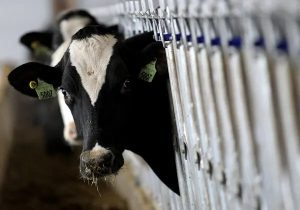
The demand shock experienced by the entire economy is turning what initially looked to dairy farmers like the first decent year in the last five into one of potentially widespread economic devastation, according to a letter National Milk Producers Federation (NMPF) president and chief executive officer Jim Mulhern sent Tuesday morning to Agriculture Secretary Sonny Perdue.
“Over the last five weeks, the [U.S. Department of Agriculture’s] estimate of 2020 milk prices reflect a drop of about $2.85 billion at the farm level,” Mulhern wrote in the letter. “Further drops are possible as the impact of the COVID-19 outbreak spreads.”
Dairy farmers – whose work as part of the agriculture industry has been reaffirmed as critical infrastructure by the U.S. Department of Homeland Security – expect to face price declines and unstable demand over the next several months as joblessness rises, schools remain closed and farm and dairy processing operations face unprecedented logistical challenges.
Congress and the Trump Administration have already helped by approving food purchases and offering flexibility in transportation rules. In its letter, NMPF said it looks forward to working with USDA on program implementation, trade facilitation and other areas but said additional remedies will be needed.
NMPF said USDA may need to reopen the signup for participation in the Dairy Margin Coverage (DMC) program, the main safety net for dairy farmers, especially small and medium-sized producers. DMC participation declined in 2020 because of forecasts for higher prices, which now have been radically revised in light of the coronavirus pandemic.
One month ago, USDA’s DMC decision tool did not forecast a single month in 2020 when the program’s margin would drop beneath the maximum coverage threshold of $9.50/cwt. As of March 20, that forecasting tool predicted margins below that level from March through October, with five of those months below $9/cwt.
NMPF suggested additional dairy product purchases to help Americans in need during what may be a period of very high demand at food banks. NMPF urged the secretary to make a substantial purchase of multiple forms of dairy products under Section 32 of the Commodity Credit Corp. (CCC), which would help stabilize prices by sending a clear demand signal to disrupted dairy markets. NMPF is supporting replenishing the CCC’s borrowing authority to ensure that USDA can support distressed producers. A significant dairy product purchase, particularly with a focus on cheese, will also provide tremendous help by offsetting the precipitous drop in dairy foodservice sales resulting from restaurant closures and school and foodservice cancellations across the country.
NMPF is also seeking compensation for potential milk disposal. As an example, in a letter Foremost Farms sent its farmers on March 17, it told its members that due to the extreme nature of the coronavirus situation and the impact on the economy, they believe the ability to pick up and process milk could be compromised. “We also need to be prepared for scenarios that would require our members to dump milk on member farms, ship milk to digestors or dispose of it in some other manner,” the letter stated.
In the letter to Perdue, NMPF acknowledged that some dairy farmers or processing plants may be forced to dispose of milk due to transportation or logistical disruptions or if demand from domestic or international markets diminishes. Given the potential for supply chain interruptions as seasonal milk production peaks this spring and many schools remain closed, elements of existing USDA programs could provide the basis for a means to compensate farmers or processors, potentially with an incentive to donate milk when possible.
Th letter noted that in the past, the Wildfires & Hurricanes Indemnity & Milk Loss program “has assisted producers who have had to dump milk because of contamination from natural disasters; perhaps this program could be refashioned to assist in this situation.”
The Families First Coronavirus Response Act, which Congress passed and the President signed, included an additional $400 million for the Emergency Food Assistance Program. “We are eager to work with your department to ensure that dairy products make up a substantial amount of the assistance provided under this provision,” Mulhern said.























